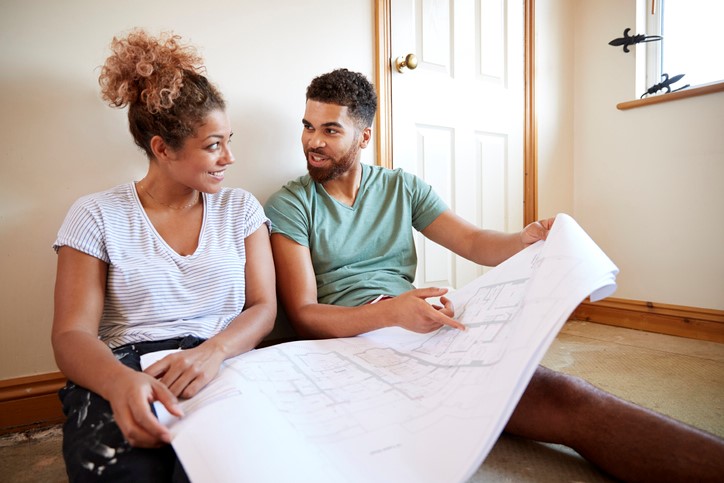How to start planning your home improvement project
Written by
Wednesday 28th February 2024

Renovating your property is a great way to transform a house into your home – and it could be much cheaper than selling up and moving too.
Here at Novuna Personal Finance, we’ve put together a guide to help you get started on your home improvement project.
Define your vision
Before you start calling in the pros, start by deciding what home improvements you want to make.
Look through magazines, check out social media or even chat to friends and neighbours who’ve undertaken similar projects. Once you have an idea of what you want to achieve, put down all your ideas onto a mood board to help you visualise the changes you want to make.
Write out a plan… and stick to it
Keep your project on track by creating a plan that details what jobs need to be done, how long they’ll take, how much they will cost and when you expect each job to be completed. This will help to make the process as time efficient and stress free as possible.
When planning your schedule of work, make sure to consider potential challenges such as delays, planning permissions, weather disruptions, budget constraints, structural issues, and snagging.
Work out your budget
Establish a realistic budget from the outset to avoid overspending, factoring in an emergency fund in case of any unexpected expenses. According to Direct Line Group, 23% of movers go over budget when redecorating or renovating a new property. So experts recommend adding around 15% to your budget as a contingency.
If you’re not sure how much various aspects of your project will cost, get a couple of rough estimates for the work you’re planning on carrying out.
Think about the best way to fund your project
You have a few options when it comes to funding your home renovation project. It’s important to decide how you’re going to pay for your project before fully getting started.
One option is to take out a home renovation loan to help turn your dreams into a reality. With Novuna Personal Finance, you can borrow between £1,000 and £35,000 with competitive rates from as low as 6.1% APR Representative (£7,500-£25,000).
Decide if you need a project manager
You might decide to enlist professional help from an architect or project manager if you’re working on a significant renovation project. They’ll be able to help with the day-to-day running of the project, understanding the technical plans and taking responsibility for legal requirements such as health and safety. They may also be able to help connect you with reliable professionals to undertake the work itself.
Of course, architects and project managers aren’t cheap – the average cost is around 15%-20% of the total spend. For smaller jobs, it may be more cost-effective to manage the project yourself.
Find the right tradespeople
Our guide on how to find the right contractor is a great place to start, offering practical tips on where to find a reliable tradesperson.
Trade directories such as Find a Builder, Rated People or Checkatrade can help to match you with suitable tradespeople in your area. It’s also recommended to do a quick check through the industry regulatory body such as the Federation of Master Builders, the Association of Plumbers and Heating Contractors, and the National Inspection Council for Electrical Installation Contracting.
Get multiple quotes and compare
Aim to get a minimum of three quotes as well as references from previous clients if possible – this will help to give you a good idea of how much the job should cost, and what it might be like to work with each tradesperson.
Ask for your quotes to be itemised so you can see the breakdown of costs from materials to labour to VAT.
Get planning permission if you need it
Before getting started on larger renovations such as adding an extension, converting your loft or building a garden room, check with your local planning officer first. They’ll be able to advise what permissions you’ll need – and make sure you always follow their advice.
If you’re building near a boundary, always check your deeds or lease for restrictions as well the Party Wall Act in case it could affect your plans.
Also, try to let your neighbours know what building works will be coming up, so that they are aware of any potential disruption.
Prep your home
Don’t start any building work until you’re sure there are no issues with your property, such as damp, damaged wall or floors, structural cracks etc. Problems like this can delay your renovation and can turn out to be costly if they’re not addressed straight away.
Once you’re ready to get started, prep your home for any disruption. Secure and protect your possessions so they aren’t impacted by dust and debris during the renovations.
Plan for disruption
If the renovation involves major disruption, such a kitchen or bathroom renovations, create a temporary living arrangement plan to ensure you can continue living comfortably while the work is underway.
You may need to move out for a short period of time or rely on friends and family to support you while your facilities are out of action. Make sure all agreements are in place before you commence your home improvements.
Commence work
Now for the exciting part… actually starting the project. By now you should have a clear plan of action, plus agreements and contracts in place with trusted tradespeople to help you achieve the home renovations of your dreams.
Follow us for the latest home improvement tips
Embarking on an exciting home improvement project? Follow us on Facebook for our latest hints and tips.
Written by
Robert Walton is a Senior Marketing Manager with many years of experience helping brands reach the right customers through clear, informative and straight-to-the-point comms. He's all about delivering top quality customer service and shouting about the great things we do here at Novuna. In his spare time, Robert dabbles with DIY and likes to write about his home improvement tips and tricks.



